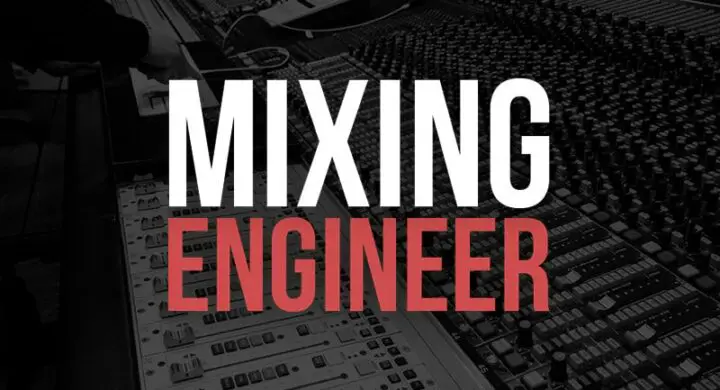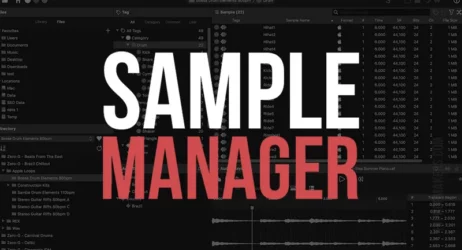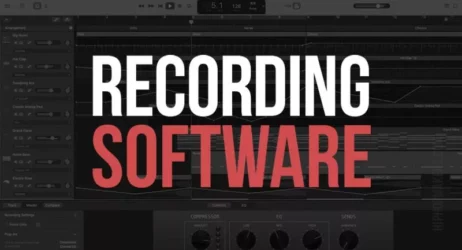This guide will answer what is a Mixing Engineer, what they do, their salary, and what skills you need to be a mixing engineer.
- What Is a Mixing Engineer
- What Does a Mixing Engineer Do
- How Much Do Mixing Engineers Make
- How To Become a Mixing Engineer
- Do I Need a Mixing Engineer Degree
- Mixing Engineer vs. Audio Engineer
- Mastering vs. Mixing
- Summary of Mixing Engineers
What Is a Mixing Engineer?
A Mixing Engineer is a person responsible for the final mix of all the elements of an audio project. Mixing Engineers mix together various audio tracks, instruments, performances, adjust volume levels, and add audio effects to create a cohesive and seamless piece of music.
A mixing engineer combines different sonic components of an auditory piece into a final rendition (final mix or mixdown) in music, film, and other auditory content.
The worth of the mix is judged by the balance of various properties, like volume, pan positioning, and additional effects.
A good mix has no conflicting sound sources, which can comprise different musical instruments, vocals in an orchestra or band, foley, or dialogue in a film.

A mixing engineer is responsible for recording original content, editing that content, and mixing the sound levels to produce a final product.
Mixing includes manipulation of sound snippets, the addition of effects, adjustment of volume, and frequency adjustment.
Using engineering equipment and audio mixing, they can also reproduce content and synchronize sound bits to ensure the timing is perfect.
They also work with vocalists ( vocal performance ), musicians, other music producers, and sound technicians to reach the finished product.
The professional skills that a mix engineer needs are:
- Music Recording
- Studio mixing
- Music production software
- Mixing / Soundboard
- Creative vision
- Flair for detail and nuance
- Collaboration
- Networking
Mixing engineers usually work in multiple fields, including film, radio, television, theatre, and music. These professionals work with various equipment and recording systems in each setting while coordinating with performing artists and maintaining audio equipment. Mixing engineers can also help fix and repair equipment that may not be performing adequately.
Mixing engineers might hold a full-time staff position or work as a freelancer. In-house positions in recording studios can be found on job listing websites, but a freelance mixing engineer must build his reputation by word of mouth.
Several clients search for talented freelancers like studios, recording artists, producers, film, video games, and TV studios. Successful mixers can even find work in live concerts and the touring world as live sound mix engineers or work as re-recording mixers in the film world.
There are two main categories of sound mixers:
- The Live Sound Mixer
- Studio Mixer
While the live sound mixer practices live sound mixing, the studio mixer’s work is done inside a tuned studio.
Although the equipment and gear between the two music industries are varied, both mixers require a well-trained ear, a firm grasp on the technique used to create sound, and practice on complicated audio equipment. This can be achieved through years of training and experience.
What Does a Mixing Engineer Do?
Following a recording session, the recording engineer passes on the tracks to the mixing engineer. They rely on their intuition in the mixing process and follow some fundamental procedures:
- Analyze and understand the client artist’s unique style, and cater technicalities according to their taste.
- Identify the essential elements of a sound to enhance.
- Determine how to improve audio tracks, which often involves de-emphasizing other audio tracks
- Manipulating volume levels to emphasize important components in each section
- Emphasizing the sonic character of every track with processors such as compression and EQ
- Adding effects like reverb and delay
- Fine-tune the final product, preparing for mastering if required
The mixing engineer provides the producer or artist with samples of his work at intervals. The feedback he receives is used to make slight tweaks and changes, and the final mix of the recording is printed and sent to the client once all parties are satisfied.
How Much Do Mixing Engineers Make?
The U.S. Bureau of Labor Statistics (BLS) reports that jobs for broadcast and sound engineering technicians are expected to multiply faster than average from 2019-1029. Job opportunities are expected to be more outside of larger cities.
The BLS also reported that the mean annual salary of a sound technician was $67,090 as of 2019. Mixing engineers earn a yearly salary of $84,100 on average, and their salary ranges from $60,000 on the lower side to $125,000 on the higher end. How much a mixing engineer eventually earns will come down to his expertise and knowledge.
How To Become a Mixing Engineer?
Mixing engineers usually start their career with formal music training, specifically a degree in recording engineering or audio recording. Other degrees relating to music can also help.
A mixing engineer also benefits from former working experiences gained outside academia. For example, experience in performing in an orchestra can help mixing engineers who specialize in classical music to create a better mix.
A mixing engineer should know how to use various gears and complex equipment, along with mixing techniques. However, extensive training cannot make up for the experience that is gained through practice over the years. A mixing engineer usually follows his intuition and trusts his well-trained ear to add finesse to any sound recording.
Do I Need a Mixing Engineer Degree?
Although there are technically no requirements for a person to work as a mixing engineer, employers may prefer post-secondary education and sound engineers to attend vocational training.
The professionals working within record engineering and sound technology have added knowledge in mechanical work, audio equipment, and electronic media.
Experience gained through working with information technology and computers also aid engineers in seeking a career as a mixing engineer.
A certificate program in audio technology, audio production, or recording technology may prove useful for individuals looking for entry-level positions.
If seeking higher positions, bachelor’s degree programs in digital recording arts, recording technology, or sound recording can help aspiring mixing engineers advance their careers. It is imperative to note that completing more advanced educational programs could help professionals quickly succeed in the field.
The Society of Broadcasts Engineers offers certification of Mix Engineers upon the successful completion of their rigorous written exam.
Mixing Engineer vs. Audio Engineer
An audio engineer helps produce a live performance or recording by balancing and adjusting sound sources using dynamics processing, equalization, and audio effects. He is also responsible for mixing, reproducing, and reinforcing sound. The main job of an audio engineer is to work on the technical side of recording, like the placement of microphones, setting of levels, and pre-amping knobs.
They also set up, soundcheck, and participate in live sound mixing with a mixing console and sound reinforcement system for corporate events, concerts, theatre, and sports games.
The recording engineer is accountable for the quality of the recorded components and, therefore, takes the required steps to optimize the recording and reduce any extraneous noises.
The mixing engineer’s job is to combine various recorded elements to create the preferred sound stage.
This mission applies to everything from the artistic intention of an album to the atmosphere of a movie, the energy of a live concert, to the drama of a television show or play.
The mixing engineer tweaks and treats the track recorded by the audio engineer to add depth and finesse to the final product, keeping the artist’s unique style in mind. This job requires extensive technical knowledge and great artistic sensitivity.
Since the missions of both audio and mixing engineers are similar, they go through the same technical training, combined with extra specific credits. As the recording is followed closely by mixing, both professionals must understand their specific roles and work together instantaneously.
Realistically, in motion pictures and recorded music, the mixing engineer is more important than the recording engineer. Mostly, mixing engineers first work as audio editors and recording engineers before moving to mix.
Related: What Is An Audio Engineer
What Is the Difference Between Mastering & Mixing?
Mixing is the starting point of post-production, where a mixing engineer balances and carves the various tracks in a music session to sound good when played together.
Mastering, on the other hand, is the last and final stage of post-production. It refers to the process of putting the finishing touches on a track by enhancing the complete sound, ensuring consistency across the album, and getting it ready for distribution.
Mastering engineers focus on these things:
- Critical Listening- Does the song have what it needs to meet the targets of its genre and market? Does it require any changes?
- Forensic fixes- Are there any rough edits that need smoothing?
- Levels- Setting final levels based on release format, character, genre, and the song itself
- Sonics- Improve overall tonal balance
- Flow and reference- Do the individual songs on an EP or album sound right together and against reference? Is the volume consistent and uniform?
- Metadata and export- Apply metadata and prepare export settings based on the listening format
- Final QC- Listen to the final product and make sure that there are no errors and everything sounds perfect.
Related: What Is Mastering Music
Summary of Mixing Engineers
Most recording engineers are skilled in producing a basic studio mix. Mixing engineers take this task to a new level using a combination of musical and technical skills to create mixes that give a recording a unique style. As the quality of the mix significantly impacts the sound of the final result.
A good mix engineer is crucial for achieving the highest quality sound.
They meticulously work on multiple tracks, ensuring that every element in a music composition – from individually recorded instruments to vocals – is well balanced.
A mixing engineer takes all the tracks recorded and combines them, adjusting the levels, effects, and pan to make the song sound as good as possible.
This process requires a keen musical ear, many years of experience, and often a mastery of software like Pro Tools and Logic Pro, which many mixing engineers use.
Professional mixing engineers take the separate tracks from the artists’ best takes and blend them into a harmonious mix sound that sounds great to the listener.
It’s truly an art form, one that requires a better understanding of important elements of sound quality. Many artists turn to these skilled audio engineers, entrusting them with their work to ensure the mixed song is of optimal audio quality.
To ensure the mix sounds good in various settings, mixing and mastering are two crucial steps that are often intertwined.
After the mixing process, a mastering engineer steps in for the final mastering session. They take the mixed track, add the final touches, and use reference tracks to compare the sound quality, ensuring the final product is well polished. While many mixing engineers also dabble in mastering, specialized mastering engineers bring an extra level of expertise to the table.
So, keep in mind that while the terms ‘sound engineer,’ ‘mixing engineer,’ and ‘mastering engineer’ are often used interchangeably, they each have distinct roles.
A sound engineer might deal with the recording process, a mixing engineer works with individual tracks to create a cohesive whole, and a mastering engineer finalizes the sound.
This collaboration creates a musical piece that is more than just a series of separate tracks – it becomes a well-crafted, sonically pleasing experience that resonates with listeners.
The work of mixing and mastering engineers is a crucial part of the music production process.
Their combined expertise ensures that every piece of music released sounds as good as possible, bringing joy to many listeners and contributing to the rich tapestry of our musical landscape.
I hope you now have a good understanding of what a Mixing engineer is and what they do.




